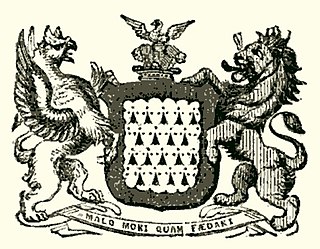William Bathe was an Anglo-Irish Jesuit priest, musician and writer.

The County Palatine of Tipperary Act 1715 is an act of the Parliament of Ireland. This act enabled the purchase by the crown of the Palatine Rights in County Tipperary given to the Earls of Ormond, later Dukes of Ormonde, over the preceding centuries. Prior to the act, the dukes appointed the sheriffs and judges of the county and owned certain revenues from the county which would otherwise have gone to the Crown.

John Barnewall, 3rd Baron Trimleston, was an Irish nobleman, judge and politician. He was the eldest son of Christopher Barnewall, 2nd Baron Trimlestown and his wife Elizabeth Plunket, daughter of Sir Thomas Fitz-Christopher Plunket of Rathmore, Lord Chief Justice of the King's Bench in Ireland and his second wife Marian Cruise. He succeeded his father as 3rd Baron in about 1513. His father, like most of the Anglo-Irish aristocracy, had supported the claim of the pretender Lambert Simnel to the English throne in 1487. After the failure of Simnel's rebellion, he received a royal pardon.
Sir James Donnellan was an Irish lawyer and politician, who became Chief Justice of the Irish Common Pleas in 1660. He was unusual among the Irish judges of the time in being of Gaelic descent, and more remarkable in that his service as a judge under Oliver Cromwell did not disqualify him from service after the Restoration of Charles II.
James Henry Monahan was one of the outstanding Irish judges of his time, and one of the first Irish Roman Catholics to achieve judicial eminence. He held office as Attorney General for Ireland and Chief Justice of the Irish Common Pleas.

William Whitshed (1679–1727) was an Irish politician and judge who held office as Solicitor-General and Lord Chief Justice of Ireland; just before his death he became Chief Justice of the Irish Common Pleas. He became the Member of Parliament for County Wicklow in 1703, and was appointed as Solicitor-General in 1709; he was Lord Chief Justice 1714–1727.
John Doherty, Q.C. (1785–1850) was an Irish politician, Solicitor-General for Ireland and senior judge, who became Chief Justice of the Irish Common Pleas.
Patrick Finglas was a leading Irish judge and statesman of the sixteenth century, who was regarded as a mainstay of the English Crown in Ireland. He was also the author of an influential "Breviat", or tract, called Of the Getting of Ireland, and of the Decay of the same, concerning the decline of English power in Ireland.
Sir John Alan was a leading English-born statesman in sixteenth century Ireland. He was a member of the Irish House of Commons, and held the offices of Master of the Rolls in Ireland, Chancellor of the Exchequer of Ireland and Lord Chancellor of Ireland. Though he was childless himself, one of his brothers, William, founded a prominent landowning dynasty in County Kildare. The family's holdings included lands at Celbridge, St. Wolstan's and Kilteel, County Kildare, as well as substantial lands in County Dublin. They also acquired a baronetcy.
Sir Thomas Luttrell was a wealthy Anglo-Irish landowner of the sixteenth-century Irish Pale. He was also a distinguished lawyer and judge who held the offices of King's Serjeant, Solicitor General for Ireland and Chief Justice of the Irish Common Pleas.
Sir Thomas Cusack (also spelt Cusacke or Cusake) (1490–1571) was an Anglo-Irish judge and statesman of the sixteenth century, who held the offices of Master of the Rolls in Ireland, Lord Chancellor of Ireland, and Chancellor of the Exchequer of Ireland, and sat in the Irish House of Commons. He was one of the most trusted and dependable Crown servants of his time, although he led a somewhat turbulent private life.
Sir Lucas Dillon, also called Luke, was a leading Irish barrister and judge of the Elizabethan era who held the offices of Attorney General for Ireland and Chief Baron of the Irish Exchequer. He supported the Lord Deputy Henry Sidney in the cess controversy and the Lord Deputy John Perrot in the Desmond Rebellions. He was held in high regard by Queen Elizabeth, but was accused by his enemies of corruption and maladministration.
Sir James Dowdall was an Irish judge of the Elizabethan era who briefly held office as Lord Chief Justice of Ireland. He should not be confused with James Dowdall, the Catholic martyr, who was his cousin.
Richard Segrave (c.1540–1598) was an Irish judge, remembered chiefly for sitting in judgement on his colleague Nicholas Nugent, who was the only Irish judge ever to be hanged for treason by the Government which appointed him.
Thomas Dillon was an Irish judge and landowner: his descendants held the title Baron Clonbrock.
John Bathe (1536-1586) was an Irish lawyer and statesman of the sixteenth century. He held several important offices, including that of Attorney General for Ireland and Chancellor of the Exchequer of Ireland. He was a member of a prominent landowning family from County Dublin, and himself added to the family estates. His children included the Jesuit William Bathe, who was a noted musicologist.

Sir William Bathe was an Irish judge and landowner. He is commemorated by the Dowdall Cross in Duleek, County Meath, which was erected by his widow Janet Dowdall in 1601. He should not be confused with his much younger cousin William Bathe of Drumcondra Castle, who was a Jesuit and noted musicologist.
Sir Robert Dillon of Newtown near Trim was an Irish judge of the Tudor era. He served as Chief Justice of the Irish Common Pleas for more than twenty years, despite repeated calls for his removal on the grounds of age and ill health.
William Hilton was an Irish politician, barrister and judge. He is now mainly remembered for his family connection to James Ussher, Archbishop of Armagh, whose sister Anne he married, and who furthered his career.
Sir Samuel Mayart (1587–c.1646) was an English-born judge in seventeenth-century Ireland, who also had some reputation as a political theorist.




